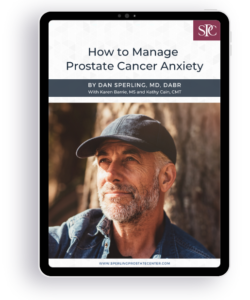If you wanted to know what men look for in choosing a new car, it seems obvious that function would be a top priority. They want reliable transportation. After that, what matters will vary from one man to another. Budget, of course, will be a consideration. Next, choices depend on things like repair record, safety, style, intended use, trade-in value, ergonomics, interior features, etc. Thus, after the basics are in place, personal values determine what other factors the buyer will take into account. In short, there’s no cookie-cutter formula for what matters most to each buyer.
It’s the same regarding what matters to prostate cancer (PCa) patients in choosing a treatment. It seems obvious that eliminating the cancer’s threat is of prime importance – why else go through treatment at all? But the fact of being diagnosed with PCa potentially raises additional anxieties. For example:
- Risk of short- or long-term urinary incontinence as a side effect of treatment
- Risk of short- or long-term erectile dysfunction (ED) as a side effect of treatment
- Time commitment required for treatment and recovery
- Risk of infection from surgery/hospitalization
- Risk of secondary cancers from exposure to radiation
- Risk of missing PCa progression while on Active Surveillance
- Risk of recurrence even after an aggressive, whole gland treatment
Given the amount of information available on the internet, today’s patients (and their loved ones) spend hours online trying to amplify their understanding of what their doctor has told them, get a handle on probabilities concerning cure and side effects, and get a peek at what other men have reported about their own experience. As the time comes to make a decision, many PCa patients find themselves slogging through facts they don’t know if they can trust to assemble a personal cost-benefits analysis. It’s as if they are spinning their mind’s compass this way and that in hopes of finding a “true north” that will get them on the best path. How to decide?
Deciding what’s most important
Without question, finding out you have PCa generates anxiety. Anxiety has a way of clouding the positive life goals and values by which you try to live. Psychologist Steven C. Hayes, PhD observes:
In my line of work, I’ve seen people struggle with all kinds of problems. And what crushes me the most is to see—again and again—how people put their lives on hold while they are fighting their inner battles. … Life has become an empty struggle with anxiety, seemingly out of necessity rather than choice. There’s only an effort to get away from the bad stuff, not an effort to get closer to what makes life precious to begin with.[i]
Choosing a PCa treatment or Active Surveillance has to do with more than post-treatment incontinence, ED or missing a window. It has to do with the principles and values that make an individual’s life meaningful. I have had many patients tell me that being diagnosed with PCa was one of the best things that ever happened to them because it was an opportunity to revisit their core values and make choices to “get closer to what makes life precious to begin with.”
Another way of putting it might be, what do you want your physical, mental, emotional and spiritual life to look life after treatment? If a treatment decision is fear-based, that is, made primarily in hopes of avoiding future unpleasantness, your life after treatment may not look very rosy if the consequences of your choice mar your comfort and quality of life; you may be tempted toward anger, blame, and cynicism. On the other hand, if your decision is opportunity-based, that is, made primarily with a goal of deepening the nonmaterial qualities that make life rewarding, no matter what happens after treatment you are more likely to accept that not every decision has optimum consequences, and you’ll strive to utilize the outcome in the most positive ways possible.
At this point in history, there is no treatment with guaranteed success and freedom from risk. Even if there were, each patient would approach it with a unique worldview and attitude, and it would either add to what life means to them or detract from it. A doctor can recommend treatments that are a good fit clinically, but no doctor can tell you which treatment best fits what your life means to YOU. The answer to the question about what’s most important in choosing a treatment lies within you. Ultimately, the way you truly want to live your life is your wisest guide.
Download Our Free Ebook: “How to Manage Prostate Cancer Anxiety”

Don’t let anxiety over prostate cancer run you. Instead, learn how you can take charge and empower yourself to manage stress and boost positive treatment outcomes with our “first aid kit” of practical tips and tools.
NOTE: This content is solely for purposes of information and does not substitute for diagnostic or medical advice. Talk to your doctor if you have health concerns or questions of a personal medical nature.
References
[i] Hayes, Steven C. “6 Signs You Don’t Know What Matters.” Psychology Today Online, Feb. 18, 2018. https://www.psychologytoday.com/us/blog/get-out-your-mind/201802/6-signs-you-don-t-know-what-matters?collection=1114312


